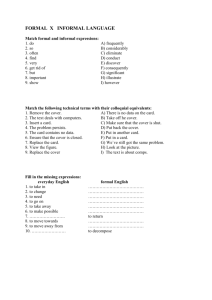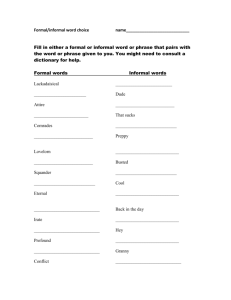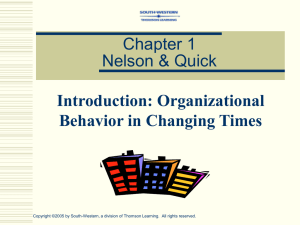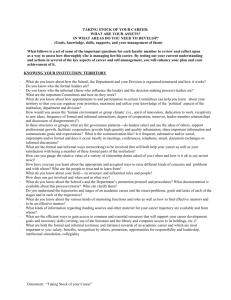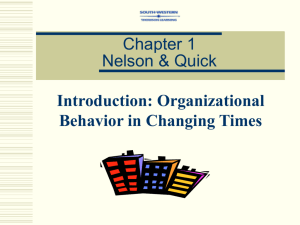Using Formal and Informal Language Appropriately
advertisement
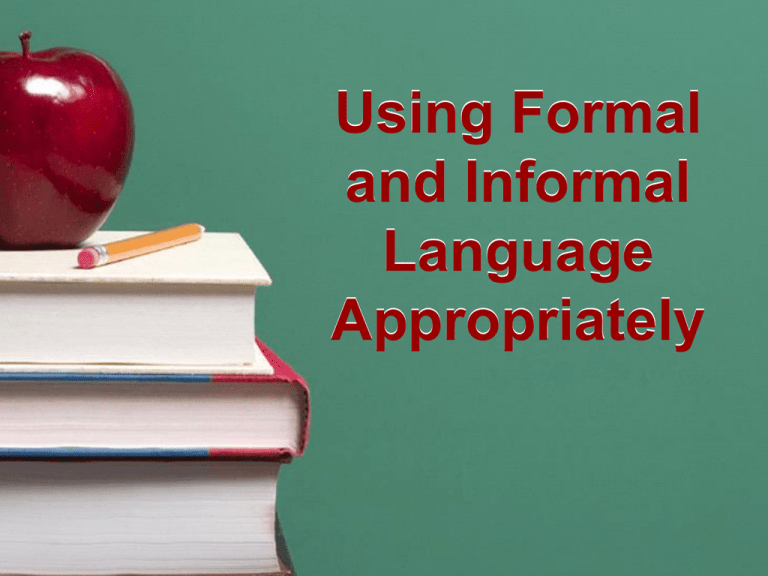
Using Formal and Informal Language Appropriately Art Imitates Life • In writing, formal and informal language work in a similar way… to influence tone, which, in turn, speaks to your audience. Tone Tone is defined as the writer’s attitude toward the subject matter and his or her readers. Audience The audience is your reader or listener– the recipient of your verbal or written communication. Diction • Diction is word choice • Word choice is important in establishing tone • Three levels of diction: – 1. high or formal diction – 2. neutral diction – 3. informal or low diction Characteristic of Formal and Informal Language Formal Informal serious objective impersonal reasoned controlled reserved light humorous personal casual offhanded "loose" plainspoken simple Why does it even matter? • Official or serious situations are often signaled by the use of formal language, while ordinary or relaxed situations are signaled by the use of informal language. – What determines formal or informal: • public versus private occasion, • The size of the audience, • The relationship of the speaker/writer with the audience, • The ability to vary your language according to the situation is often considered a mark of an educated person. Certain Situations Formal Situations Informal Situations job interview principal’s office visit business letter class essay text message friendly letter “locker” conversation Journal-style writing What makes INFORMAL language? • Simple grammatical structure • Personal evaluation – Using first person – Using forms of “you” • Colloquial or slang vocabulary – Contractions are considered slang What makes FORMAL language? • Formal language, even when spoken, is often associated with the conventions expected of written standard English. • Although you generally don’t worry as much about formality in speaking, it is extremely important in writing because of the knowledge you are recording through the written word. Continued on next slide… Remember… when you are speaking, writing or analyzing language in a What makes formal formal situation… language (continued)? • Formal language does not use contractions • Avoids personal pronouns such as: you, I, us, me, and we • Includes more polysyllabic words—BIGGER words • Complex, complete sentences • Avoidance of colloquial or slang vocabulary Remember… when you are speaking, writing analyzing What tooravoid inlanguage formalin a formal situation… writing… • • • • Exclamation marks Needless words like “well” and “you know” First and second person point of view Beginning sentences with coordinating conjunctions • Too many short, choppy sentences that could be combined to make more complex sentence structures What to avoid in formal writing… • Avoid most shortenings in formal writing. In formal English, you talk on the “telephone,” not the “phone” • Know what acronyms may be used in your writing. In formal English, you should limit your use of acronyms, abbreviations making use of letters that stand for certain words • Similarly, limit your use of absolute terms, such as "everybody," "always," "never" • Avoid cliché’s and colloquialisms Common Colloquialisms and Informal Words • • • • • • • • • • A lot, alot Ain't Alright, all right Anyways Anybody, anyone As Big, large great Buy Contraption Could of, would of, should of • • • • • • • • • • • Cute Fellow For sure Get, obtain Get, understand Gonna, wanna Got How come How do you do Humongous Kid Common Colloquialisms and Informal Words Continued • Kinda, kind of, sorta, sort of • Let • Like • Most • On the other hand • Pretty • Real, really • Shall, will, should, would • • • • • • So Thus, thusly Until, till, ‘til Use Use to Yeah Formal or Informal? After reading The Red Badge of Courage, it is easy for you to see Crane’s purpose in telling the story. Formal or Informal? Native American literature is rich in cultural information and poetic language. Formal or Informal? Native American literature isn’t rich in Puritain characteristics. Formal or Informal? Native American Literature is oral. It is passed down by word of mouth. Formal or Informal? Everybody knows that Snickers is the best candy bar. Formal or Informal? The field trip participants will meet at the A-Town WalMart. References “Formal/informal language.” 15 October 2008 <http://www.arts.gla.ac.uk/ SESLL/EngLang/LILT/forminf.htm>. “How to Avoid Colloquial (Informal) Writing.” 16 October 2008 <http://www.wikihow.com/Main-Page>. “Tone: A Matter of Attitude.” Capital Community College. 2006. 15 October 2008 <http://grammar.ccc.commnet. edu/grammar/composition/tone.htm>. Homework • Answer the following prompt: – Both Abraham Lincoln and Dr. Martin Luther King, Jr. wrote their speeches for the same purpose. Identify the purpose and trace the argument in BOTH speeches to determine how each author achieves his purpose? • Use your comparison chart for examples and help • Due: Monday, Dec. 8th
